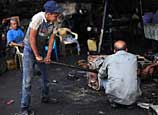
 |
| Author Liang Hong (China Daily) |
Village life is not what it used to be.
Liang Hong's new book, Going Out of the Liang Village, documents life in today's villages, showing things are far from idyllic.
The rural hubs are fast emptying, with residents in the prime of their lives moving away.
Liang, a professor of Chinese literature from China Youth University for Political Sciences, comes from Liang village in Henan province. She has spent the past two years trailing her former fellow villagers.
Many Liang villagers have left their land to become factory workers, oil pump mechanics, security guards and pedicab drivers in cities. Some have moved to the westernmost part of the Xinjiang Uygur autonomous region, some are in the southern Guangdong province, some in Inner Mongolia while some have traveled as far as Spain.
For the past 30 years, they have been abandoning the village, leaving their elderly parents and young children behind.
These migrant workers have no plans to return, but they haven't found a new home either, Liang says. The farmers-turned-wage-earners don't feel a sense of belonging in cities and still cling to their countrymen miles away from home.
The book profiles migrant workers from the village who still live together, mostly in makeshift housing because their lives are far from "permanent". They don't make new friends in their new homes, even though some of them have stayed in one place for 30 years.
"We are used to sticking to one cell phone number so that we don't lose touch," the 40-year-old author says. "The villagers are quick in ditching theirs, getting new numbers without notice as they move."
These people are estranged from the city.
"They are less respected because of their backgrounds. They're detached," Liang writes in the book.
The biggest problem, the author observes, is that they can't afford to have their family there.

















 5,000th baby born in
5,000th baby born in
water in Shanghai


![]()
